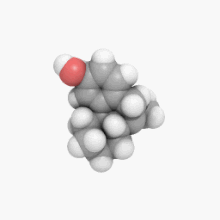Dekstrorfan
Dekstrorfan (DXO) je psihoaktivni lek iz morfinanske hemijske klase koji deluje kao antitusivni lek (supresant kašlja) i disocijativni halucinogen. On je dekstro-stereoizomer racemorfana, gde je leva-polovina levorfanol. Dekstrorfan se proizvodi O-demetilacijom dekstrometorfana CYP2D6-om. Dekstrorfan je NMDA antagonist i doprinosi riziku zloupotrebe dekstrometorfana.[1]
 | |
 | |
| IUPAC ime | |
|---|---|
(+)-17-methyl- 9a,13a,14a-morphinan- 3-ol | |
| Pravni status | |
| Pravni status |
|
| Identifikatori | |
| CAS broj | 125-73-5 |
| ATC kod | none |
| PubChem | CID 5360697 |
| Hemijski podaci | |
| Formula | C17H23NO |
| Molarna masa | 257.371 g/mol |
Farmakologija
уреди- Nekompetitivni antagonist N-metil-D-aspartatnog receptora (NMDAR).[2][3][4]
- Agonist σ1 i σ2 sigma receptora.[5][6]
- Antagonist α3β4, α4β2, i α7 nikotinskog acetilholinskog receptora.[7][8]
- Bloker L-tip naponom-kontrolisanog kalcijumskog kanala (LVGCC).[4][9]
Reference
уреди- ^ Zawertailo, LA; Kaplan, HL; Busto, UE; Tyndale, RF; Sellers, EM (1998). „Psychotropic effects of dextromethorphan are altered by the CYP2D6 polymorphism: a pilot study”. Journal of clinical psychopharmacology. 18 (4): 332—7. PMID 9690700.
- ^ Wong BY, Coulter DA, Choi DW, Prince DA (1988). „Dextrorphan and dextromethorphan, common antitussives, are antiepileptic and antagonize N-methyl-D-aspartate in brain slices”. Neuroscience Letters. 85 (2): 261—6. PMID 2897648. doi:10.1016/0304-3940(88)90362-X.
- ^ Church J, Jones MG, Davies SN, Lodge D (1989). „Antitussive agents as N-methylaspartate antagonists: further studies”. Canadian Journal of Physiology and Pharmacology. 67 (6): 561—7. PMID 2673498.
- ^ а б Kamel IR, Wendling WW, Chen D, Wendling KS, Harakal C, Carlsson C (2008). „N-methyl-D-aspartate (NMDA) antagonists--S(+)-ketamine, dextrorphan, and dextromethorphan--act as calcium antagonists on bovine cerebral arteries”. Journal of Neurosurgical Anesthesiology. 20 (4): 241—8. PMID 18812887. doi:10.1097/ANA.0b013e31817f523f. Архивирано из оригинала 18. 07. 2011. г. Приступљено 06. 05. 2011.
- ^ Richter A, Löscher W (1997). „Dextrorphan, but not dextromethorphan, exerts weak antidystonic effects in mutant dystonic hamsters”. Brain Research. 745 (1-2): 336—8. PMID 9037429. doi:10.1016/S0006-8993(96)01254-1.
- ^ Chou YC, Liao JF, Chang WY, Lin MF, Chen CF (1999). „Binding of dimemorfan to sigma-1 receptor and its anticonvulsant and locomotor effects in mice, compared with dextromethorphan and dextrorphan”. Brain Research. 821 (2): 516—9. PMID 10064839. doi:10.1016/S0006-8993(99)01125-7.
- ^ Damaj MI, Flood P, Ho KK, May EL, Martin BR (2005). „Effect of dextrometorphan and dextrorphan on nicotine and neuronal nicotinic receptors: in vitro and in vivo selectivity”. The Journal of Pharmacology and Experimental Therapeutics. 312 (2): 780—5. PMID 15356218. doi:10.1124/jpet.104.075093.
- ^ Hernandez SC, Bertolino M, Xiao Y, Pringle KE, Caruso FS, Kellar KJ (2000). „Dextromethorphan and its metabolite dextrorphan block alpha3beta4 neuronal nicotinic receptors”. J. Pharmacol. Exp. Ther. 293 (3): 962—7. PMID 10869398.
- ^ Kim HC; Ko KH; Kim WK; et al. (2001). „Effects of dextromethorphan on the seizures induced by kainate and the calcium channel agonist BAY k-8644: comparison with the effects of dextrorphan”. Behavioural Brain Research. 120 (2): 169—75. PMID 11182165. doi:10.1016/S0166-4328(00)00372-7.
| Molimo Vas, obratite pažnju na važno upozorenje u vezi sa temama iz oblasti medicine (zdravlja). |